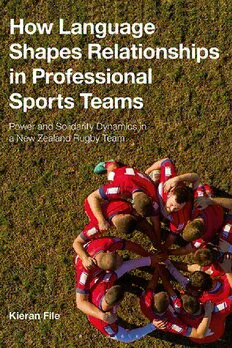
How language shapes relationships in professional sports teams: Power and solidarity dynamics in a New Zealand rugby team PDF
257 Pages·2022·2.589 MB·English
Most books are stored in the elastic cloud where traffic is expensive. For this reason, we have a limit on daily download.
Preview How language shapes relationships in professional sports teams: Power and solidarity dynamics in a New Zealand rugby team
Description:
While sport is gaining considerable research attention from fields such as psychology, marketing and sports science, the language of competitive sport remains largely unexplored, despite the obvious importance of and requirement for language in all aspects of sporting activity. Addressing fundamental language-focused questions such as how captains speak to their teams, how professional athletes speak to their fans through the media, how coaches give feedback to players, and how referees talk to players, can help us strengthen an important dimension of research into sport, and provide insights to sports professionals in relation to communication and interpersonal relationship management in competitive environments.This book explores issues related to the use of spoken language in the management of professional roles and relationships. Focusing on key sporting stakeholders (athletes, coaches, referees and sports journalists), it examines the interpersonal nature, challenges and issues with respect to communication in sporting contexts. The focus is on spoken language use in on-field, match day and professional sporting activities and in off-field communication, defined here primarily as public-directed communication through media channels. This helps capture the complexity of sports contexts in which relationships need to be managed internally and externally, often requiring varying linguistic strategies.
See more
The list of books you might like
Most books are stored in the elastic cloud where traffic is expensive. For this reason, we have a limit on daily download.
